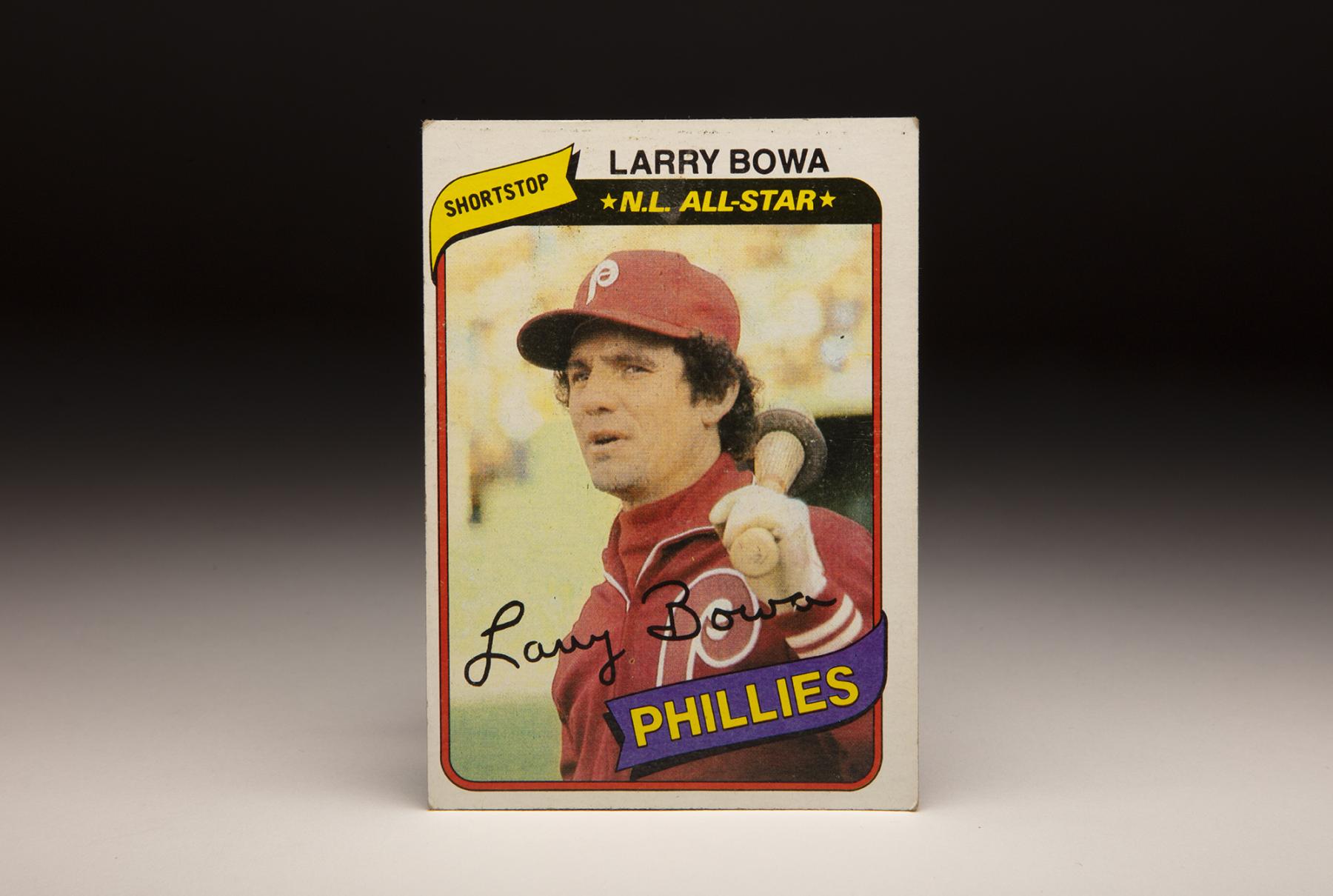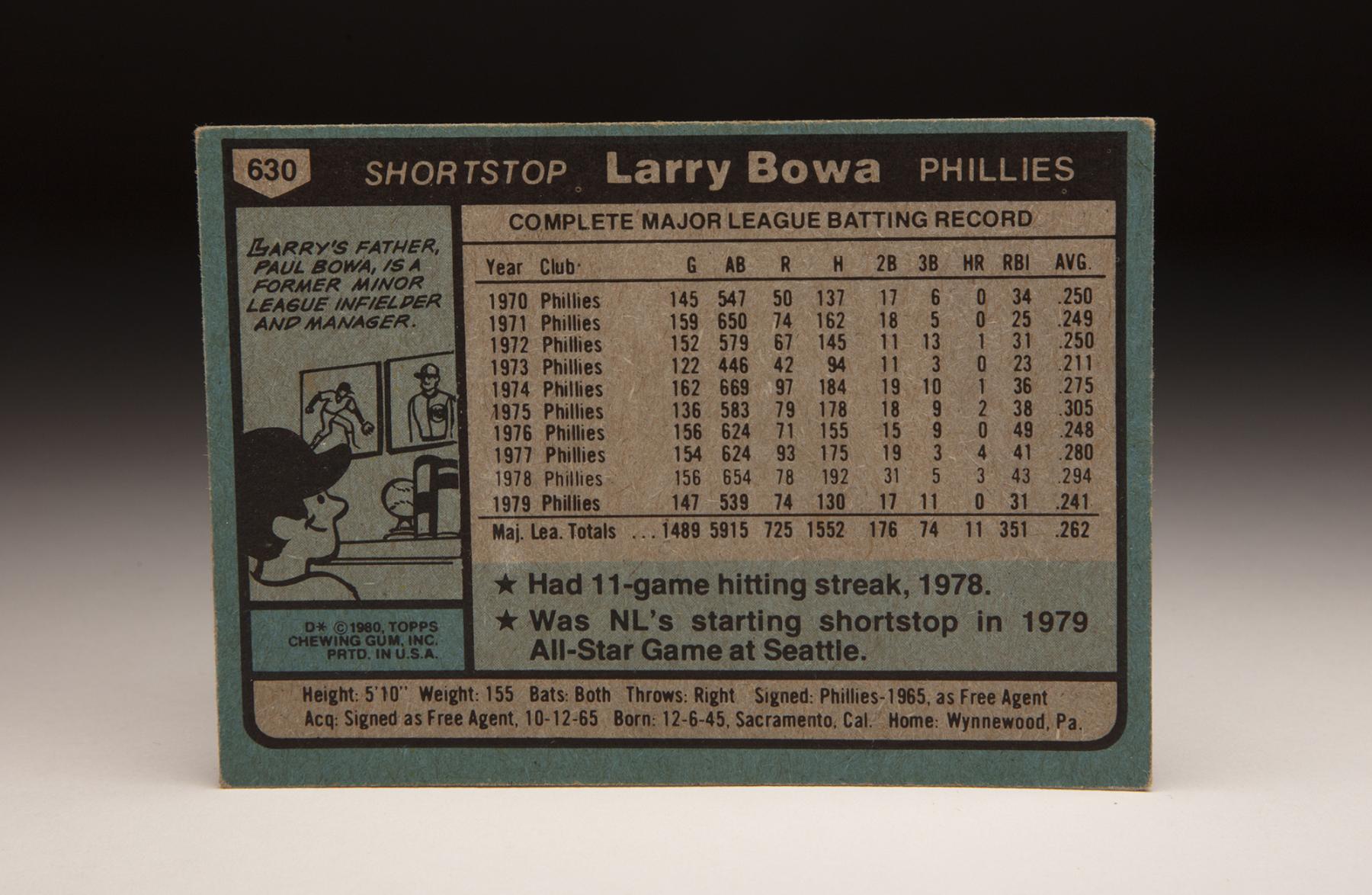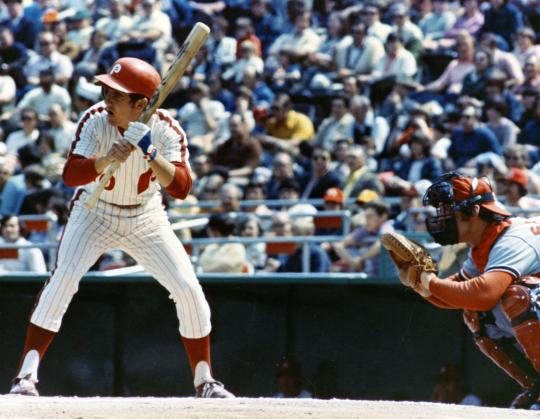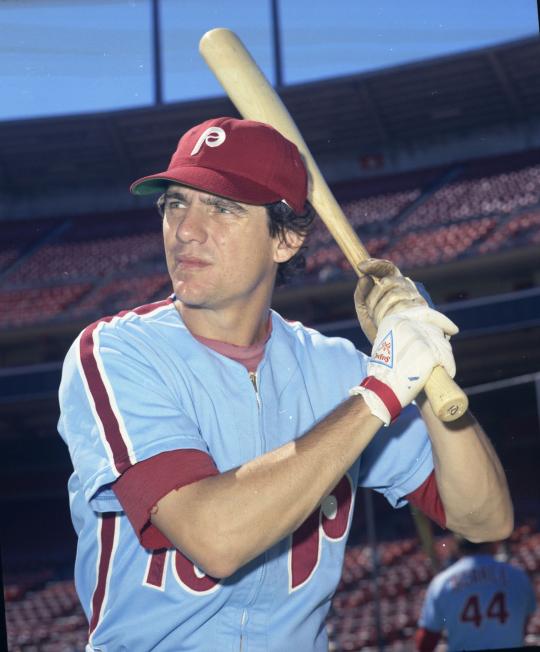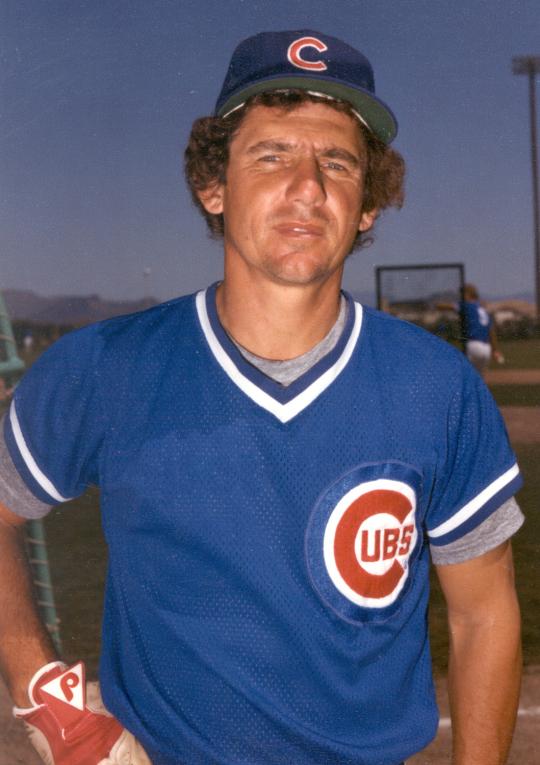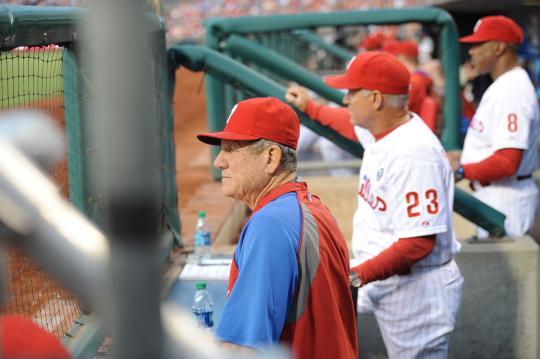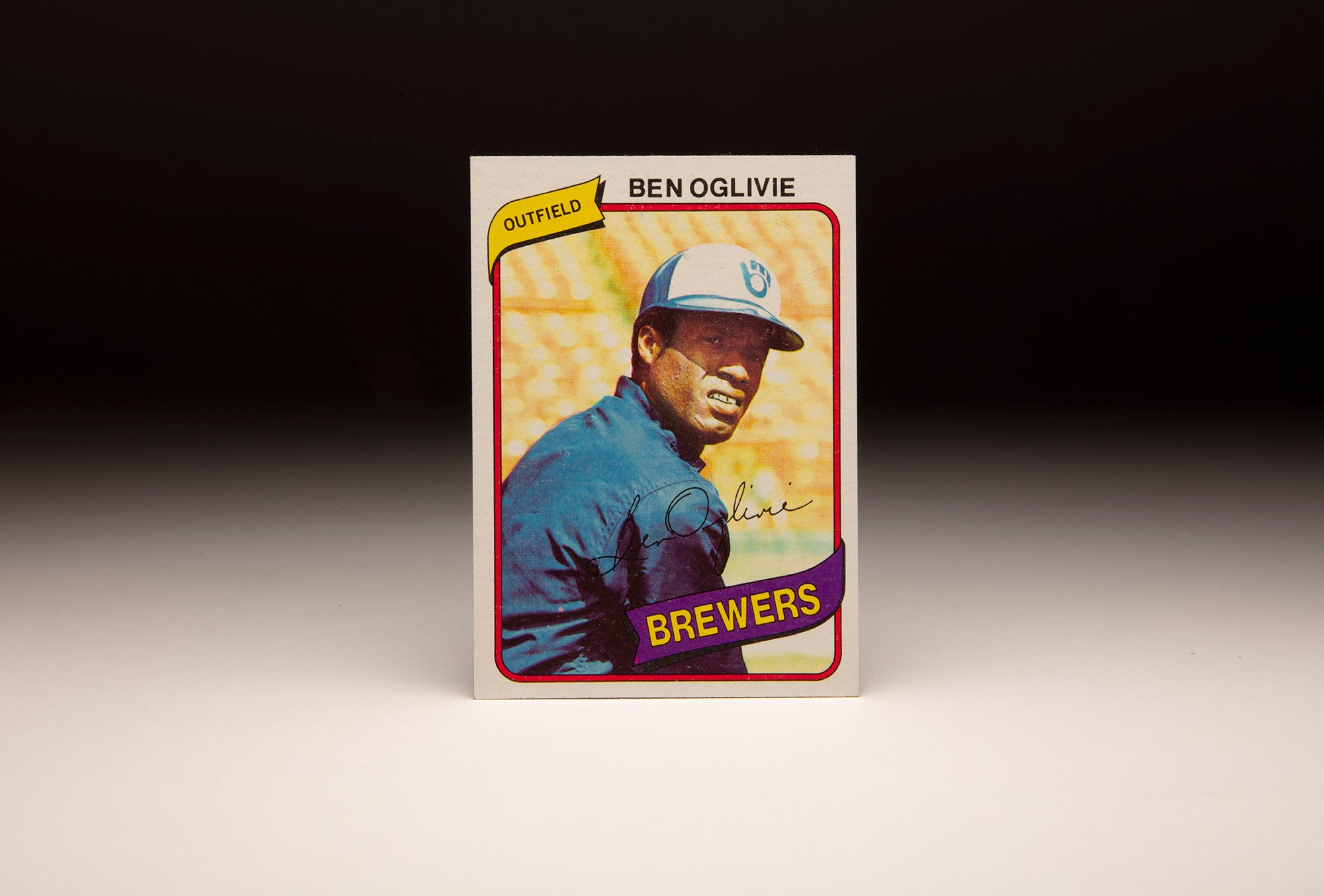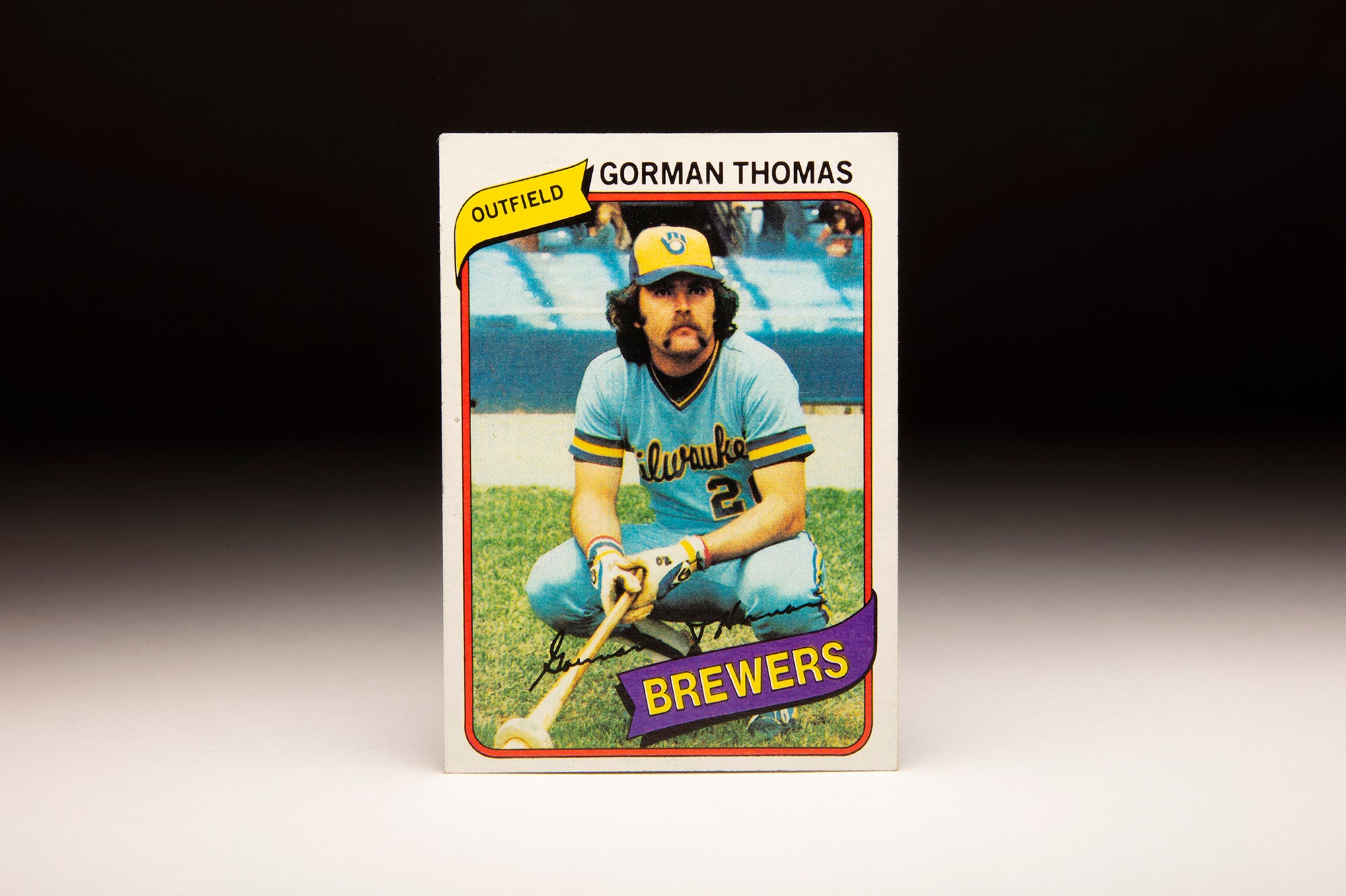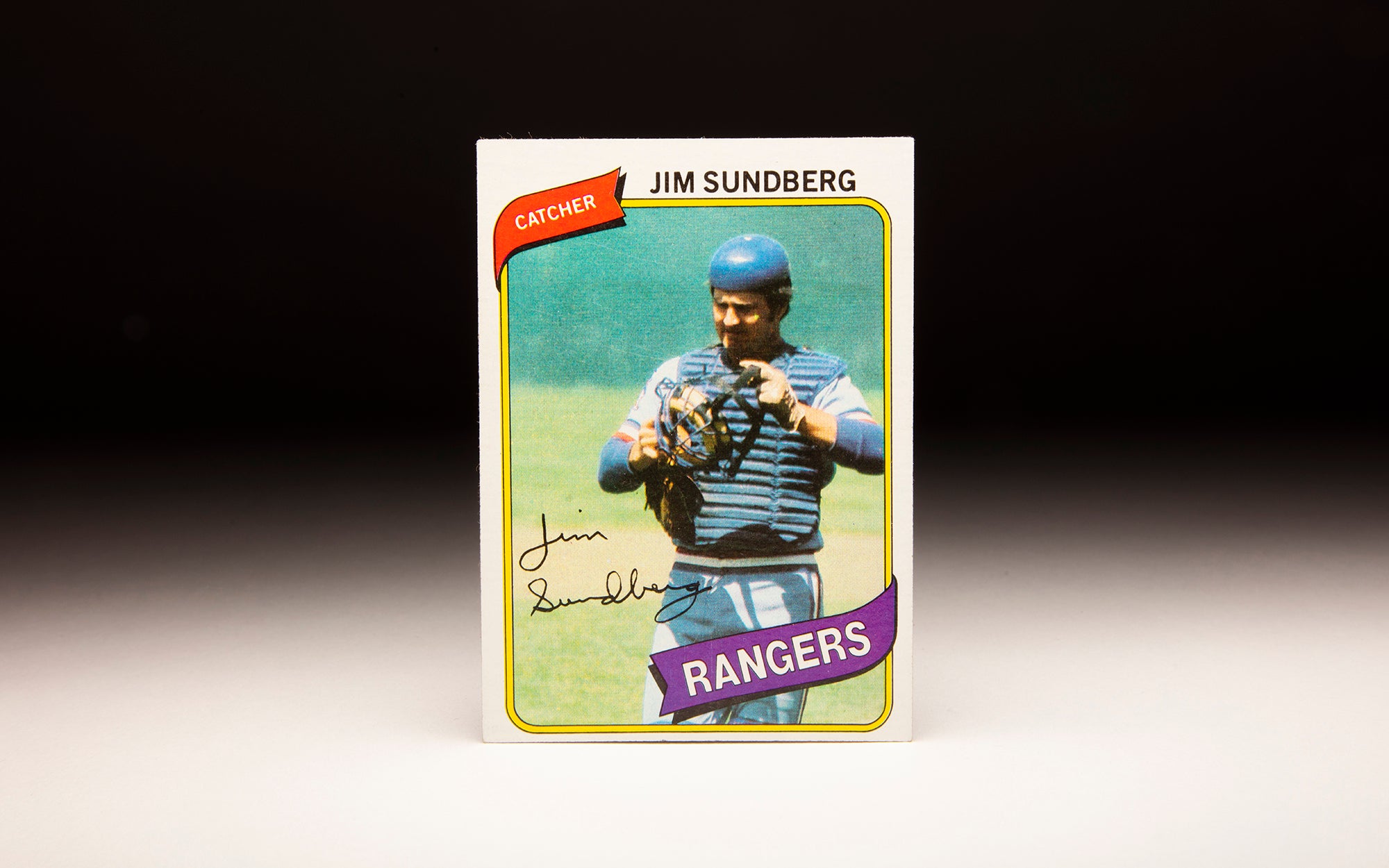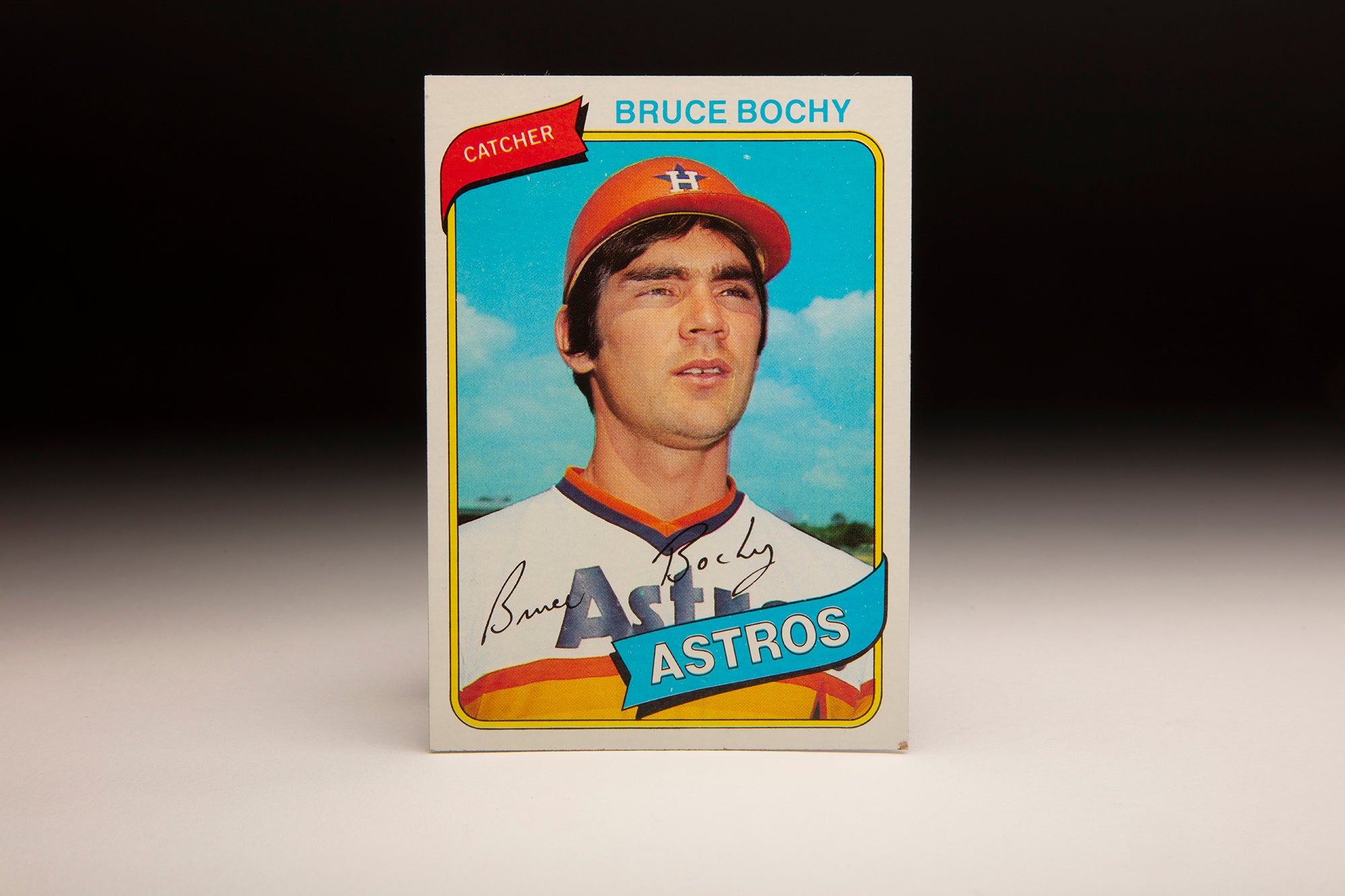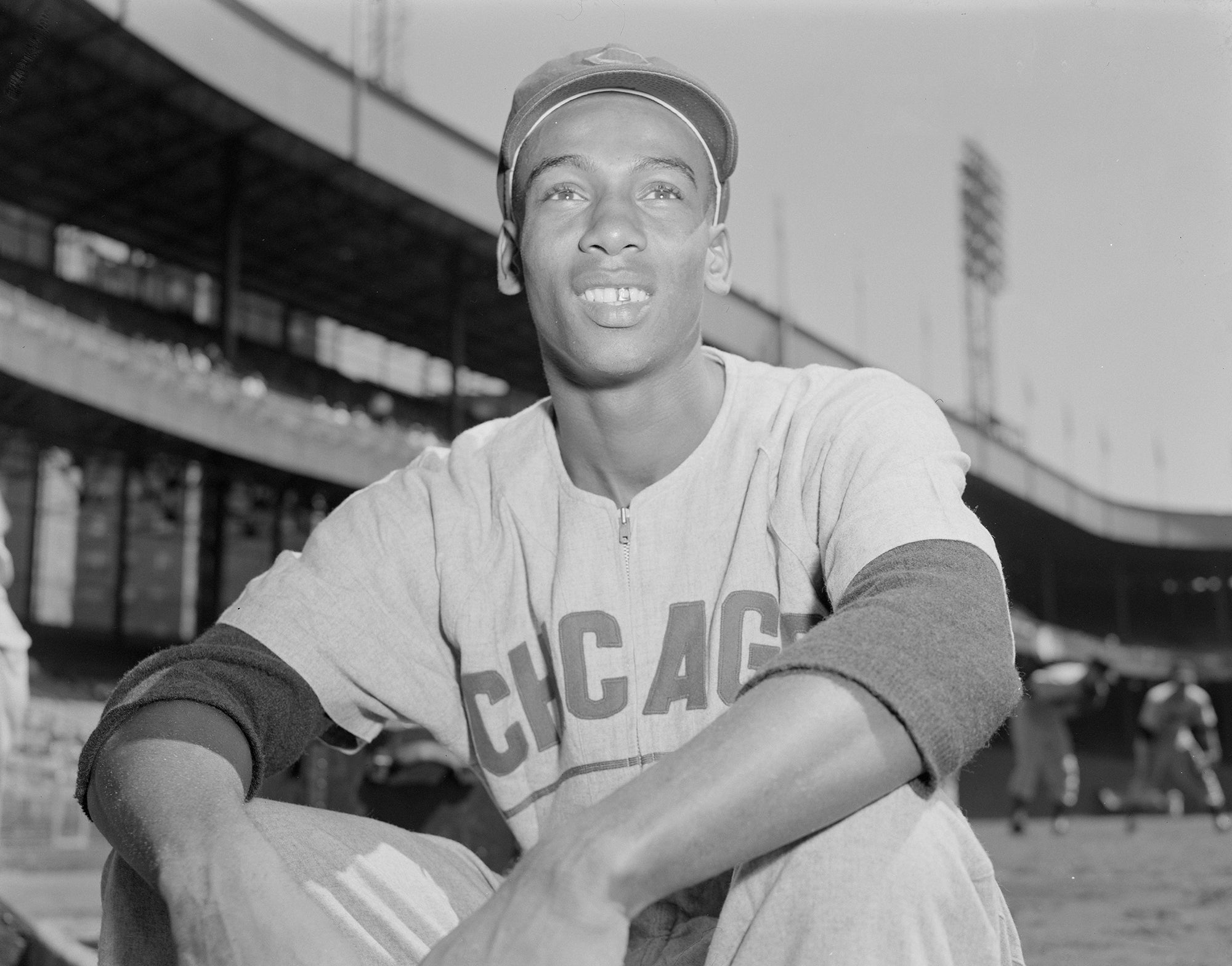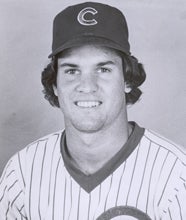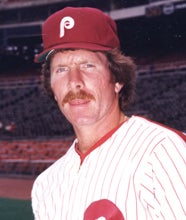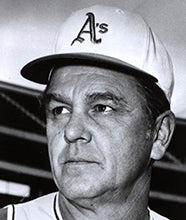- Home
- Our Stories
- #CardCorner: 1980 Topps Larry Bowa
#CardCorner: 1980 Topps Larry Bowa
He was one of the last of a species that once roamed the baseball landscape: A fiery, slap-hitting, hell-bent-for-leather shortstop who seemed to always be on the winning side.
Larry Bowa came to the plate 9,109 times in his career and hit 15 home runs. No other player in big league history with as many plate appearances has fewer than 28 homers, and no other player with as many plate appearances has a lower career on-base percentage (.300) and slugging percentage (.320).
But Bowa was a five-time All-Star, a two-time Gold Glove Award winner and a World Series champion because of all the other things he did on the field. And all that was fueled by his burning desire to win.
Born Dec. 6, 1945, in Sacramento, Calif., Bowa grew up in a baseball family but went virtually unnoticed as a prospect due to his 5-foot-10 frame that carried fewer than 125 pounds. He was cut from his high school baseball team multiple times – though he starred for McClatchy High School in basketball – before continuing his quest to make the big leagues by playing American Legion baseball. He eventually made the team at Sacramento City College as a utility infielder after graduating from high school in 1962.
Phillies Gear
Represent the all-time greats and know your purchase plays a part in preserving baseball history.
Hall of Fame Membership
There is no simpler, and more essential, way to demonstrate your support than to sign on as a Museum Member.
When the starting shortstop fell ill, Bowa got his chance.
“I always said he had the defensive skills to be in the major leagues,” Del Bandy, Bowa’s coach at Sacramento City College, told the Sacramento Bee. “I just didn’t know if he could hit.”
Bowa could run, however, and impressed area bird dog scouts with his determination. Eventually, he came to the attention of Phillies scout Eddie Bockman.
“I never saw him make a play,” Bockman told the Bee. “I never saw him swing the bat. He was getting on the plate ump from the bench in the second inning (of the first game of a doubleheader) and got tossed. I was ready to leave, but (area scout Bill Avila) convinced me to stay.
“He was in the lineup (for the second game), but he got all over the same ump before the second game. And bang! He got tossed again.”
Bowa was not selected in the inaugural MLB Draft in 1965, but Bockman persuaded Phillies general manager Paul Owens to take a chance on Bowa as a free agent. Bowa received a $1,200 bonus and was sent to Spartanburg of the Western Carolinas League in 1966.
Bowa hit .312 at Spartanburg, teaming with another future big leaguer – second baseman Denny Doyle – to power the team to a record of 91-35. Bowa earned a late-season promotion to Triple-A San Diego, but then missed all but 29 games of the 1967 season while serving in the military.
But the Phillies thought enough of Bowa to bring him to the Florida Winter Instructional League after the 1967 season, and in 1968 Bowa was the shortstop for Double-A Reading of the Eastern League, where he hit .242 in 133 games.
Bowa was a favorite of Phillies manager Gene Mauch before reaching the big leagues, but Mauch was dismissed early in the 1968 season and replaced by Bob Skinner. In Spring Training of 1969, Skinner toyed with the idea of keeping Bowa on the big league roster as a utility player – especially after Bowa learned to switch hit in the FWIL following the 1968 season.
“If he was just going to be a utility man all his life, I’d take him north with the team,” Skinner told the Camden (N.J.) Courier-Post. “He’d be a big asset as a pinch-runner or a defensive infielder. But there’s a possibility that Larry might develop his hitting and become a starter within the next few years. In that case, I should send him to the minors to play…let’s get him another year’s experience swinging from the left side.”
Bowa went back to the minors and started at shortstop for the Eugene Emeralds of the Pacific Coast League, hitting .287 while stealing 48 bases. After a third straight fall playing in the FWIL following the PCL season, Bowa was primed to make the big league club in 1970.
Bowa led the Phillies in hits in the spring of 1970 en route to winning the Opening Day job at shortstop.
“He didn’t get to the big leagues because of his hitting,” new Phillies manager Frank Lucchesi told the Lancaster (Pa.) New Era. “His speed…and his defense got him here.”
That combination kept Bowa in the lineup despite a .170 batting average as late as May 27. But Bowa hit .273 the rest of the way to finish with a .250 average, 50 runs scored and 24 stolen bases. He placed third in the National League Rookie of the Year voting.
The next season, Bowa was the Phillies Opening Day leadoff hitter and went on to pace the NL that season with 650 at-bats while hitting .249 with 74 runs scored and 28 steals.
“If I had to pick out one thrill that I’ve had in the big leagues for two years,” Lucchesi told United Press International, “it’s sticking with Larry Bowa. I can go back to 1970 when the kid was hitting .181 and more than a few people were down on him and just about ready to give up on him.”
Bowa’s fielding also improved in 1971 as he led the league in fielding percentage with a big league record mark of .987, breaking the standard of .985 set by Ernie Banks (for shortstops appearing in at least 150 games) in 1959. Bowa also set a new mark by committing just 11 errors.
Bowa was even better in 1972, totaling just nine errors while again leading the league in fielding percentage with a .987 mark and winning his first Gold Glove Award. At the plate, Bowa hit .250 and led the majors with 13 triples.
In Bowa’s first three big league seasons, the Phillies averaged 66 wins a year, costing Lucchesi his job midway through the 1972 campaign. But the team was building a core that would eventually bring the franchise unprecedented success – and Bowa was one of those first building blocks.
Bowa signed a two-year deal worth a reported $120,000 prior to the 1973 season, but appeared in only 122 games that year – hitting .211 – due to a broken ankle that sidelined him for all of August. But following the season, the Phillies acquired second baseman Dave Cash from the Pirates – and suddenly the Phillies had one of the best infields in baseball with Willie Montañez at first base and future Hall of Famer Mike Schmidt at third.
Philadelphia finished the 1974 season with a record of 80-82 as Bowa hit .275 with 39 steals and 97 runs scored en route to his first All-Star Game selection. Cash totaled 206 hits and batted .300.
“The most important thing Dave Cash brought over to this team was his attitude,” Bowa told the Philadelphia Inquirer. “He said: ‘You’ve got to believe in your abilities.’
“Pretty soon I was thinking: ‘If Dave Cash thinks this much of my ability, then I should too.’”
Bowa topped the .300 mark for the first time in 1975, hitting .305 as the Phillies won 86 games and finished in second in the NL East. Then in 1976, Philadelphia advanced to the postseason for the first time in more than a quarter century – winning 101 games and the division title.
Now 30 years of age, Bowa hit .248 with 30 stolen bases and led all NL shortstops with 156 games played while earning votes on the NL Most Valuable Player Award ballot for the second straight year. He was now the highest paid shortstop in baseball.
“Baseball’s given me everything I have,” Bowa told the Philadelphia Inquirer in 1976. “And everything I have I’ve worked hard to get. I think I’m probably as dedicated as anyone in baseball. I try to do everything perfect.”
The Phillies, however, were unable to perfect their play in the National League Championship Series – a trend that lasted three years as Philadelphia lost to the Reds in 1976 and the Dodgers in both 1977 and 1978. Bowa continued to be the glue that held the Phillies together, however, hitting .280 in 1977 and then batting .294 with a career-high 192 hits in 1978 while leading NL shortstops in fielding percentage for the fourth time.
Bowa finished third in the NL MVP voting in 1978, receiving the only three first-place votes that did not go to winner Dave Parker of the Pirates. Pittsburgh frantically chased the Phillies down the stretch before Philadelphia wrapped up the division title during the season’s final weekend.
“I never had trouble sleeping until this year,” Bowa told the Wilmington (Del.) News-Journal following the 1978 regular season. “I always thought about the game most of the time, but I never had nightmares about it before.”
Following the 1978 season, the Phillies signed free agent Pete Rose and installed him at first base. But the team struggled throughout the 1979 season and finished fourth – with Bowa earning his fifth All-Star Game (and starting for the third time) despite his batting average falling to .241.
Then in 1980, Philadelphia found the magic they were looking for. Under new manager Dallas Green, who replaced Danny Ozark late in 1979, the Phillies started slowly and endured a couple summer slumps – finding themselves six games back of the Pirates and Expos following a doubleheader sweep at the hands of Pittsburgh on Aug. 10.
But from there, the Phillies went 36-19 to win the division – with Bowa batting .267 to go along with his always-steady defense at shortstop. He hit .316 in a tense five-game series win over Houston in the NLCS, then batted .375 with three stolen bases in the World Series to help Philadelphia defeat the Royals in six games and win the first World Series title in franchise history.
“This whole season was a battle,” Bowa told Gannett News Service following Game 6. “Without a doubt, we had some ghosts to bury around here.”
At 35 years of age, Bowa maintained his hold on the starting shortstop job in 1981, hitting .283 in 103 games in that strike-shortened season. But the Phillies lost to the Expos in the Division Series, and when Bowa and the team couldn’t come to an agreement on a new contract, a trade was arranged.
Green, having moved on to become the Cubs’ general manager, agreed to swap shortstops with the Phillies, sending Iván DeJesus to Philadelphia for Bowa. But Green also insisted that the Phillies include a minor league infielder with Bowa: Ryne Sandberg.
Bowa immediately signed a four-year deal with the Cubs worth a reported $2 million. Sandberg, meanwhile, began a career that would take him to the Hall of Fame.
Bowa batted .246 in 1982 as Green reshaped the roster. And though Bowa was slowing down – he stole a career-low eight bases that year – he still provided consistent play in the field, posting a .973 fielding percentage in 140 games at shortstop. The next year, the Cubs moved Sandberg from third base to second base, where he teamed with Bowa on a top shelf double play combo. Bowa led all NL shortstops in fielding percentage (.984) that season for the sixth-and-final time, committing only 11 errors in 145 games.
The Cubs were ready to win by 1984, but Bowa – at 38 – was finally showing signs of age. He hit just .223 that year in 133 games and was 3-for-15 (.200) in the NLCS against the Padres as San Diego rallied from a two-games-to-none deficit to advance to the World Series.
In 1985, the Cubs turned to top prospect Shawon Dunston at shortstop, and Dunston started on Opening Day, relegating Bowa to the bench. But the Cubs sent Dunston back to the minors in May for more seasoning, and Bowa reclaimed the job for three months before Dunston was recalled. Bowa hit .246 in 72 games for Chicago that year before the Cubs released him upon Dunston’s return.
Bowa signed with the Mets a week later but hit just .105 in 14 games with New York. The Mets offered Bowa a $300,000, one-year deal to return in 1986 as a utility player, but Bowa instead chose to become the manager of San Diego’s Triple-A team in Las Vegas.
“If money was important, I would have signed with the Mets,” Bowa told the Associated Press. “They offered me a good contract, but I just didn’t feel I could be a part-time player.
“I got the most out of my ability. I played hard.”
Bowa managed Las Vegas to the Pacific Coast League title in 1986. He was named Padres manager on Oct. 28, 1986, replacing Steve Boros – who had replaced Dick Williams just months before when Williams resigned days before the start of Spring Training.
Bowa seemed a natural fit for the Padres, who were accustomed to the fiery Williams. But San Diego went 65-97 under Bowa in 1987 and then began the 1988 season at 16-30 before Bowa was dismissed on May 28, 1988.
The Phillies hired Bowa as their third base coach less than three months later, and Bowa stayed in that job through 1996 – helping the Phillies win the NL title in 1993. He was the Angels third base coach from 1997-99 and held the same job in Seattle in 2000 before taking over as the 49th manager in Phillies history on Nov. 1, 2000 – replacing Terry Francona.
“There’s no chance he’ll change,” said Ken Forsch, who played against Bowa in youth leagues in Sacramento. “He’s still got a short fuse, and if there’s a problem, he’ll go right in your face. No one will work harder.”
Bowa managed the Phillies for three full seasons and most of a fourth, posting winning records in 2001, 2003 and 2004. He was named the NL’s Manager of the Year in 2001.
“I just didn’t understand the mentality,” said Bowa of his time with the Padres when he took over the Phillies. “I know how hard I had to work. I didn’t have as much talent as a lot of guys, but if taking 100 ground balls or hitting until my hands bled worked for me, I figured it would sure work for them. I expected them to have the same passion and work ethic that I had.”
“I will never accept losing,” Bowa said. “But I’ve learned how to deal with it better.”
Bowa coached with the Yankees in 2006-07 and the Dodgers from 2008-10, working for longtime friend Joe Torre. After stints on television, Bowa returned to the Phillies as a bench coach under Sandberg and remained with the club on field through 2017.
In 16 seasons as a player, Bowa hit .260 with 2,191 hits, 318 stolen bases and 987 runs scored. He retired as baseball’s all-time leader among shortstops with a .9797 fielding percentage and topped all NL shortstops with 2,222 games played.
“If somebody enjoys playing baseball more than me,” Bowa told the News-Journal in 1978, “I’d like to meet him.”
Craig Muder is the director of communications for the National Baseball Hall of Fame and Museum

